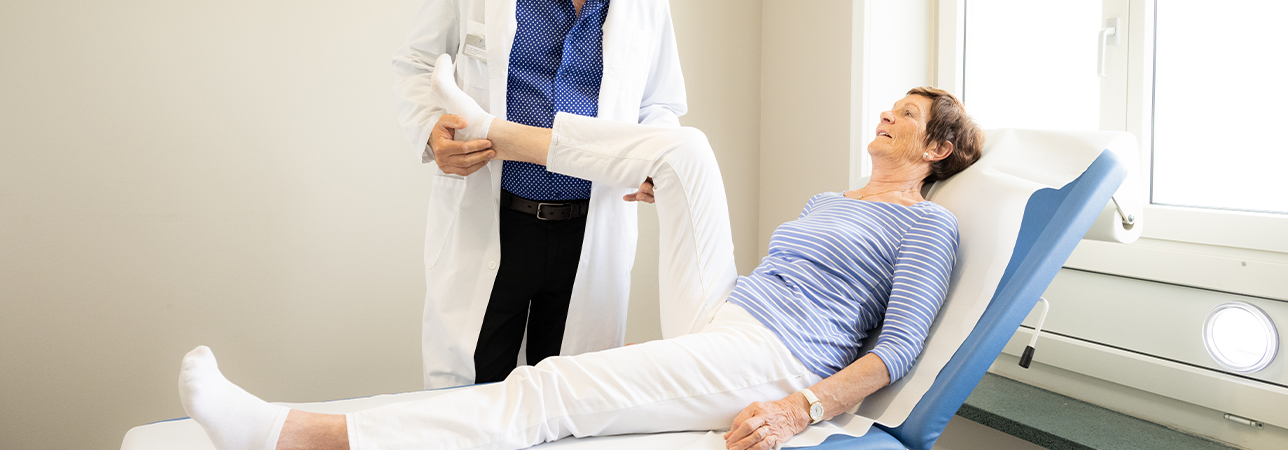
Hip impingement
Hip impingement is also known as femoroacetabular impingement syndrome or FAIS. Hip impingement is a condition whereby the movement of the hip joint is restricted by a change in shape or a deformity.
It is typical of the condition for the hip to get stuck during certain movements and positions. Over time, the joint cartilage or the rim of the socket wears down, resulting in pain. This process is exacerbated by sports that have a direct impact on the hip joint.
Symptoms
Hip impingement can occur in adolescents and adults. Amateur and competitive athletes are particularly at risk. Pain occurs in the groin area and the front of the hip. Those affected report feeling a pinching sensation or stabbing pains in the groin area. Hip pain may occur when sitting or climbing stairs. A typical feature of hip impingement is that you cannot turn your hip joint properly inwards.
As the pain sometimes mirrors the symptoms of other hip conditions, a medical examination is necessary in order to make the correct diagnosis.
Causes
The exact cause of hip impingement is not yet clear. The malformation of the hip joint can be traced back to accidents, femoral head maturity disorders in childhood or genetic predisposition.
Hip impingement is very often diagnosed in people who were very active in adolescence. There are also sports that increase the risk of illness due to typical types of strain. These are sports that necessitate frequent flexion and internal rotation of the hip joint.
Diagnosis
The basis of the examination is an X-ray of the pelvis and hip joint. These scans are important for evaluating the changes in the bones. MRI is also used to accurately assess the damage to the joint.
Treatments
The treatment of hip impingement depends on the severity of the condition and can be conservative or surgical.
Conservative therapies
If the cartilage of the joints has not yet been damaged and the hip is only slightly deformed, conservative hip impingement treatment can be carried out with the help of regular physiotherapy and muscle-building exercises. Building muscle develops better core strength, which helps protect the joint. The treatment is supported by anti-inflammatory and pain-relieving drugs, which are injected directly into the hip joint.
In conservative treatment, it must be ensured that the cartilage is not damaged further. If further cartilage damage occurs, surgical treatment may not be possible.
Surgical treatment
If conservative treatment is unsuccessful, surgical correction of the deformity is necessary. The procedure is intended to prevent long-term damage to the cartilage and thus reduce the risk of osteoarthritis.
Hip impingement surgery is usually performed using minimally invasive hip arthroscopy. During the procedure, a camera probe is inserted into the hip joint and the deformities are corrected.
If the deformities or the cartilage damage are very severe, open surgery is carried out. In this operation, parts of the rim of the hip joint are replaced.
If osteoarthritis occurs as a result of hip impingement, the use of an artificial hip joint is necessary.
Aftercare
Aftercare depends on the arthroscopic surgery performed. In the first few days after the operation, it is important to use crutches to protect the hips. Full weight-bearing is usually possible to do without pain after one to two weeks.
Targeted physiotherapy is used to improve mobility, strength, posture and gait. Building muscle strengthens the body and reduces stress on the joints.
FAQs
When will I be able to go back to work?
Where your job only involves light physical activity, you can return to work a few days after the procedure. For activities that put a strain on the hip joint or require a high degree of physical exertion, you will need to wait four to six weeks before returning to work.
When can I start exercising again after the procedure?
You can start doing sports again after a minimum of four to six weeks. You will need to wait at least three months before resuming more intensive sports.








